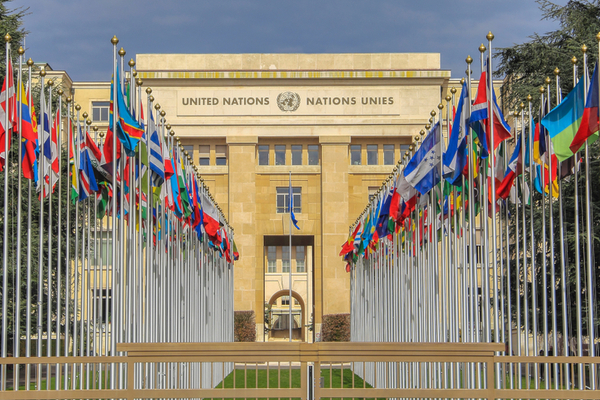The search terms ‘terror,’ ‘terrorism’ and ‘terrorist’ collectively yield about 164,000 hits across the entire U.N. website.
By Mike Wagenheim, JNS
Whether U.N. employees committed acts of terrorism “would be a question of opinion,” Farhan Haq, deputy spokesman for U.N. Secretary-General António Guterres, said at a press briefing on Tuesday in response to a JNS question.
After Israel charged that 12 employees of the U.N. Relief and Works Agency participated in Hamas’s Oct. 7 massacre, 16 donor countries suspended aid to UNRWA. Some have since resumed funding the U.N.’s Palestinian-only aid and social services organization.
Israel has also said that about 10% of UNRWA’s workforce has direct ties to Hamas and other Gazan terror groups. The United Nations has said that it is investigating the allegations.
JNS asked Haq if any other U.N. agency has ever been accused of having the sort of ties to terror that UNRWA is said to have.
Haq is “aware of different allegations of different criminal acts against different entities in the past,” he told JNS. He added that criminal acts are “what we’re really talking about in this case,” of UNRWA.
JNS asked if any of those prior “criminal” cases involved terrorism.
“Terror is not something for which there’s any particular definition at the U.N. So I wouldn’t,” Haq said. “It would be a question of opinion, really, about what those attacks would be.”
In the past, the United Nations and Haq’s boss appear to have understood some definition of “terrorism.”
The United Nations has an Office of Counter-Terrorism. On April 17, 2018, Guterres said at the 16th meeting of the United Nations Counter-Terrorism Centre Advisory Board that “As conflicts have grown in intensity and number over the past decade, terrorist attacks have increased and spread, destabilizing societies and entire regions.”
“This is why I established the Office of Counter-Terrorism, which includes the U.N. Counter-Terrorism Centre, to provide strategic leadership and effective coordination to the U.N. system,” he added. “No one is born a terrorist, and nothing justifies terrorism, but we know that factors such as prolonged unresolved conflicts, lack of the rule of law and socioeconomic marginalization can all play a role in transforming grievances into destructive action.”
The search terms “terror,” “terrorism” and “terrorist” collectively yield about 164,000 hits across the entire U.N. website.
The U.N. secretary-general drew widespread criticism, including from Israel, for telling the U.N. Security Council on Oct. 24 that “It is important to also recognize the attacks by Hamas did not happen in a vacuum. The Palestinian people have been subjected to 56 years of suffocating occupation.”
U.N. Security Council Resolution 1556, which passed in 2004, refers to “threats to international peace and security caused by terrorism” and the “imperative to combat terrorism in all its forms and manifestations by all means, in accordance with the Charter of the United Nations and international law,” among nearly two dozen “terror” references.
As recently as Sept. 29, Guterres reiterated “the solidarity of the United Nations with the government and people of Pakistan in their efforts to address terrorism and violent extremism,” according to his spokesman, Stéphane Dujarric.
“I condemn the terrorist attacks that took place in Pakistan this Friday. It is abhorrent that these attacks targeted people during peaceful, religious ceremonies,” he wrote that day on social media. “Those responsible must be held to account.”
U.N. staffers have been accused of crimes including sexual abuse and exploitation; drugs and weapons trafficking; and theft and malfeasance. JNS could find no evidence of prior accusations of extensive ties between any U.N. agency and terror organizations.



